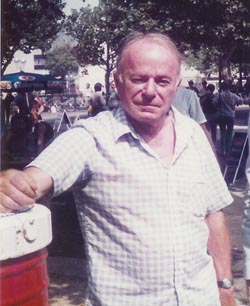|
 Born
in South Africa, he was educated at the South African
College High School, took a first degree at the University of Cape Town
in 1934 and a doctorate in Mathematical Physics at the University
of London in 1953. After a spell as demonstrator in physics at Cape
Town, he emigrated to Britain. Prior to the outbreak of the Second
World War, he undertook ionospheric research in Marconi’s
Wireless Telegraph Company, transferring to the Government’s
Telecommunications Research Establishment after the outbreak of
hostilities to carry out research on radar. In 1941, he enlisted in the
Royal Air Force Volunteer Reserve, leaving in 1943 to go to Aberdeen
University to run a special degree course for radio officers under the
wartime Hankey Scheme. After the war was over, he returned to
industrial research, first until 1949 in Mullard’s Radio
Valve Company on microwave electronics and then on television and
photo-electric tubes at EMI’s Research Laboratories. In 1955
he was appointed to a lectureship (later readership) in the University
of Edinburgh Department of Electrical Engineering where he undertook
research on both solid-state and high-vacuum electronics, and also
contributed to the development of the Postgraduate Diploma Course in
Electronics and Radio. His work on dense beams of electrically charged
particles was taken up by the National Aeronautics and Space Agency in
the USA for the design of ion propulsion of space vehicles, and at its
invitation he spent time working at Stanford University during 1962.
Born
in South Africa, he was educated at the South African
College High School, took a first degree at the University of Cape Town
in 1934 and a doctorate in Mathematical Physics at the University
of London in 1953. After a spell as demonstrator in physics at Cape
Town, he emigrated to Britain. Prior to the outbreak of the Second
World War, he undertook ionospheric research in Marconi’s
Wireless Telegraph Company, transferring to the Government’s
Telecommunications Research Establishment after the outbreak of
hostilities to carry out research on radar. In 1941, he enlisted in the
Royal Air Force Volunteer Reserve, leaving in 1943 to go to Aberdeen
University to run a special degree course for radio officers under the
wartime Hankey Scheme. After the war was over, he returned to
industrial research, first until 1949 in Mullard’s Radio
Valve Company on microwave electronics and then on television and
photo-electric tubes at EMI’s Research Laboratories. In 1955
he was appointed to a lectureship (later readership) in the University
of Edinburgh Department of Electrical Engineering where he undertook
research on both solid-state and high-vacuum electronics, and also
contributed to the development of the Postgraduate Diploma Course in
Electronics and Radio. His work on dense beams of electrically charged
particles was taken up by the National Aeronautics and Space Agency in
the USA for the design of ion propulsion of space vehicles, and at its
invitation he spent time working at Stanford University during 1962.
An
old interest in mathematical logic and a growing appreciation of the
unexploited possibilities of the use of digital computers combined to
spark him into exploratory work on programming computers to do
mathematical reasoning and not merely arithmetic computation. A
year’s appointment for this purpose in 1964-65 at the Science
Research Council’s Atlas Computer Laboratory led to a
decision to forsake the comparative security and tranquillity of
electrical engineering to set up an independent research unit to pursue
his new interests. Called the Metamathematics Unit, it quickly
established an international reputation as a centre for research in
artificial intelligence, extending the scope of its work for automatic
proof of mathematical theorems to the programming of the other
activities such as induction and ‘commonsense’
reasoning, as well as finding applications in the field of operational
research. Many of the researchers who emerged from that Unit became
major figures in AI: Bob Kowalski, Pat Hayes, Bob Boyer, J Strother
Moore, Alan Bundy.
In
1971, the Metamathematics Unit was re-named the Department of
Computational Logic and incorporated into the School of Artificial
Intelligence, and in the following year Bernard Meltzer was appointed
to a Personal Chair in Computational Logic. In 1974 he became Head of
what was now the Department of Artificial Intelligence, a position
which he held until 1977. Under his guiding hand Edinburgh’s
reputation as a centre for excellence in AI research grew and embarked
on an undergraduate teaching programme. Thanks to an initiative by Alan
Bundy, Sylvia Weir, Richard Young, Rod Burstall and Jim Howe the first
course, AI2, was launched in 1974/75. An introductory course, AI1, was
launched in 1978/79 and by 1982, the department was able to offer its
first joint degree, Artificial Intelligence and Linguistics.
Bernard
Meltzer retired on 31 December 1978.
Besides his
scientific contribution, Bernard Meltzer also worked energetically on
behalf of the national and international development of artificial
intelligence. He co-edited the well-known series of Machine
Intelligence volumes. In 1970 he started the journal of Artificial
Intelligence and edited it until his retirement. He was a member of the
International Joint Council in Artificial Intelligence and he chaired
the UK professional body, the Society for the Study of Artificial
Intelligence and the Simulation of Behaviour. Taken together with his
pioneering work, this will ensure that he will be remembered as a
member of that small select band of scientists, which includes John
McCarthy and Marvin Minsky in the USA and Donald Michie in Edinburgh,
who founded Artificial Intelligence as a discipline in its own right.
In
addition to his academic work Bernard Meltzer put his energy into
humanitarian causes: he was chairman of both the Scottish Campaign for
Nuclear Disarmament and the Scottish Anti-Apartheid movements. His
curiosity, openness and enthusiasm inspired all those working with him.
|
Informatics Forum, 10 Crichton Street, Edinburgh, EH8 9AB, Scotland, UK
Tel: +44 131 651 5661, Fax: +44 131 651 1426, E-mail: school-office@inf.ed.ac.uk Please contact our webadmin with any comments or corrections. Logging and Cookies Unless explicitly stated otherwise, all material is copyright © The University of Edinburgh |